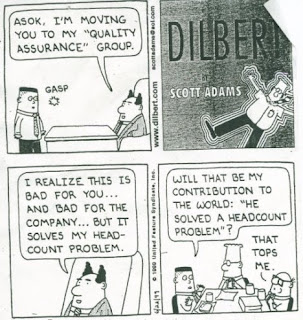
When I look around, I see that the Gen-X have accomplished a lot more professionally than the baby boomers as they have had more opportunities. However, they are more discontent in life than the baby boomers. The discontenment is high in people, who are in profession that is well paying, like the IT folks. I spent time thinking about the reason behind this discontentment. This blog captures my views that I bounced off, a few of my friends. They seem to agree with this perspective, even if some of you may disagree, there is some truth to what I am about to say. So sit back and let my mouth run off :-) .
Baby boomers had to work harder than the Generation X as there were fewer opportunities. Most of the baby boomers used to work for the Government or Public Sector company. The salaries were not high. On an average the baby boomers had more mouths to feed than the Gen-X. They were loyal to their employers. Rat-race was not a term they were used to. Most of them had a single employer for their whole life. They had more or less fixed working times. Most of them were back at home by 6.00 in the evening and would devote more time to their families. They had life beyond work. Some were active participants in their cooperative society, some were regular temple goers, some were regular visitors at their society clubs. There was no cell phone or late evening conference calls to disturb them at home. Goods like TV, fridge, motorcycle, washing machine etc., were a luxury to them. They had to plan finances to buy them. Then there was the biggest goal of all - building one's own house. It took almost 15+ years of service before they could contemplate buying a house. By the time they felt comfortable managing the loan payments for the house, they had to plan to finance for the higher education of their eldest kid. Then the not so further milestone was the marriage of the daughter. Planning for the daughter's marriage was a big milestone and nothing else in life was as critical. Given these financial commitment to be met, the baby boomer had to put up with career dissatisfaction, if any. Their priority in life was very clear, to fulfill the personal commitment even at the expense of their career growth. Some of them had gone to the extent of giving up promotions in their career if it involved relocation to a different city. They felt it would affect the family. They were loyal, not only to their employer but to their family.
With not so great salaries, with more children to feed and educate, with the many financial commitments that were spaced out all through their career life, they could not afford to be discontent with their work/career. At every point of their career they had to plan to meet one or the other financial commitment and hence could not afford to worry about whether they were happy with their career or not. For them work was a means of livelihood and hence they were more tolerant to any inadequacies in their career. With the number of career opportunities being lower they could not risk their job.
So the baby boomers were quite happy and content as their priorities in life was much clearer. The work-life balance was more tilted towards life. They had many personal financial milestones to meet that kept them chugging along in life.
Now coming to the Gen-X. They have more opportunities and in the quest for the perfect career they keep hopping from one job to the other, and their expected job satisfaction eludes them. Even with more opportunites, they are more discontent.
The money comes very easily to Gen-X , they do not need to work very hard for it. The Gen-X
in Information Technology are over paid compared to the other disciplines. What took a decade for their parents to buy luxury goods, they get within the first year of employment. With the salaries increasing year on year, the Gen-X er can afford to buy a home, a lot earlier than the baby-boomers. Many of them have a house, car and other luxuries even before they get married. The financial milestones that were evenly spaced out for the baby-boomers are collapsed into a short window of a decade for the Gen-X. So when Gen-Xer is in his early 30's, he is already financially well accomplished and sees a big vacuum in what he should look forward to for accomplishing. Unlike the baby boomers, the Gen-X er lives in a nuclear family. Their life is centered around work, few good friends and their immediate family - wife and kids. Their involvement in society is limited. Their work-life balance is more tilted towards work, to the extent that even during their vacation, they are mentally at work. Even in their career they progress so fast that a few of them become senior managers by mid 30s. Like the Samsung ad "What's Next" constantly bothers them. This is the source of their discontentment. With 20 odd professional years left, with no strong purpose in life, Gen-X is confused.
By taking a leaf out of baby-boomer's book, Gen-X can find contentment. They can create virtual milestones spaced apart that they have to achieve. They can volunteer to do more for society. They can go beyond their immediate nuclear family and reach out to distant relatives and friends. They can work towards a better work-life balance. They can take risks to try out new career options and eventually see if it can lead them to finding their purpose of life.
An anonymous quote to end this blog ..
"When you can think of yesterday without regret and tomorrow without fear, you are near contentment."



